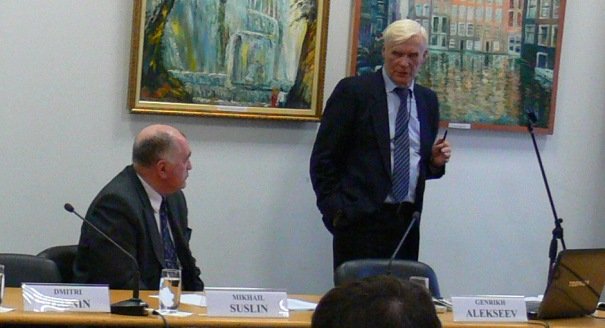Registration
You will receive an email confirming your registration.
Changes wrought by the consequences of global warming have had a significant influence on economic activity in the Arctic. Carnegie Moscow Center hosted a discussion of Arctic development with Genrikh Alekseev of the Arctic and Antarctic Research Institute, Mikhail Suslin of Sovcomflot shipping company, Alexei Kokorin of the WWF (World Wildlife Fund) Russia, and Sergei Vakulenko of Gazprom Neft. Carnegie Moscow Center’s Dmitri Trenin gave the opening remarks and Carnegie Moscow Center’s Anna Bessonova moderated.
A Geopolitical Viewpoint
Trenin pointed out that security in the Arctic and peaceful development of the Arctic region are the core components of maintaining a global geopolitical balance.
The Implications of Warming in the Arctic
The clearest example of a current climate change in the Arctic—melting ice—has both negative and positive effects on the economic activity in the region, participants agreed.
- Negative Effects: According to Alekseev, negative consequences include the risk of strong waves and wind intensification for navigation as well as the possibility of ice blocking parts of the Northern Sea Route (NSR).
- Positive Effects: Suslin noted that climate change in the Arctic has a significant positive impact on the intensity of shipping along the NSR. According to him, warming in the Arctic creates conditions that may enable the NSR to be used as a transit line between Europe and Asia. This could reduce the time of delivery and distance, as well as the costs of freight transport.
Relativity of Warming
Kokorin argued that the idea of global warming is true only in the short term, over the next several decades. In this period, the net effect of man-made factors on the climate will be comparable to natural climate variability or may even exceed it. However, longer-term forecasts suggest that the world is moving toward a new ice age, he asserted. Kokorin also added that the forecasts concerning the Arctic in 2012-2013 also do not indicate very significant warming, adding that those who propose to reject using atomic icebreakers may be acting prematurely.
Economic Activity in the Arctic and Environmentally Friendly Solutions
Kokorin believed that development of the Arctic requires a compromise between the business companies operating in the region and environmentalists. He argued that it is possible to achieve “balanced and environmentally friendly decisions concerning the Arctic.”
